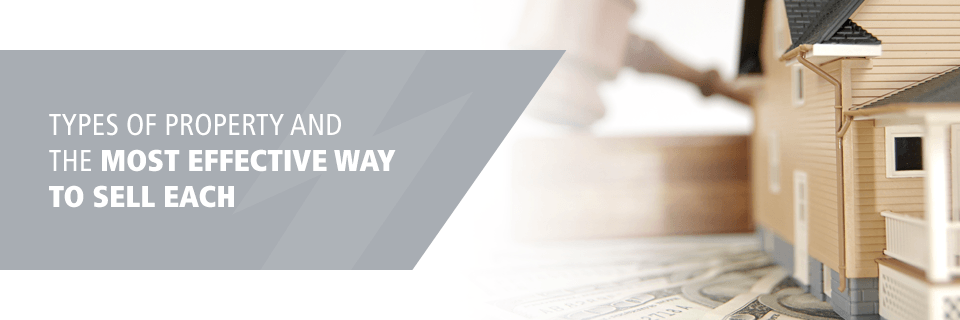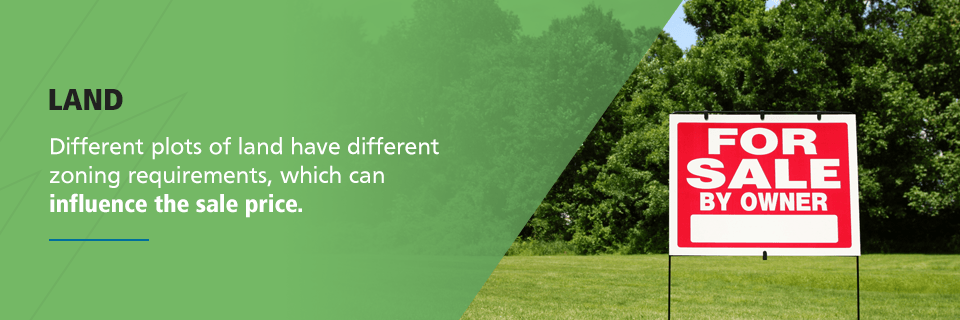
Sell Your Property in a Private Sale or Auction
Should You Sell Your Property at Auction or in a Private Sale?
If you want to sell a property you own, whether it's a commercial property, residential property or a plot of vacant land, you have multiple options. Depending on your goals and timeline, you can work with a traditional real estate agent, sell the property by yourself or auction it off. Each option has its pros and cons. It's up to you to weigh the benefits and drawbacks of a private sale or real estate auction and choose the option that best meets your needs, and that will help you get the best price possible for your property.

Pros and Cons of Selling Your Property Through an Auction
The process of selling real estate through an auction is different from the standard method of listing properties for sale. Instead of showing the property to prospective buyers and waiting for them to put in an offer, an auction presents a commercial building, residential property or piece of land to a group of interested buyers all at once.
Buyers bid on the property, and the person or entity that puts in the highest bid by the end of the auction ends up winning it (as long as they meet any set minimums). If you are thinking about selling real estate at auction, it's worth understanding the full process, as well as your options during the auction process. It's also good to have an idea of the pros and cons of selling a property through an auction.

What Is the Real Estate Auction Process?
The real estate auction process is usually a multi-stage process that begins when a property owner first contacts an auction company. Often, the first step of selling a property at auction is analyzing it to see if it is a good fit for the auction process.
The next step is to put the gears in motion to sell the property at auction. As the seller, you can choose to set a reserve for the auction, meaning you won't sell the property if the bids come in lower than a specified amount. You also have the option of setting up an auction without a reserve. An auction professional can advise you on your sale's reserve strategy.
You can also decide if you'd like to sell the property through a live auction, an online property auction , or a hybrid of the two. As the seller, your situation and needs determine the timeline for the sale and the date for the auction.
After you've decided on the format of the property auction and a timeline for it, it's time to start marketing. The auction company you are working with will help promote your sale and get the information about your property out in front of the most appropriate prospective buyers. Marketing the property typically takes place for about 30 days before the auction date.
Once the day of the auction arrives, buyers will place their bids, and the person or entity who exceeds your reserve with the highest bid will win. Since the auction process usually takes place on an accelerated timeline, the winning buyer often signs the purchase agreement on the day of the auction. Typically, closing takes place within 30-45 days of the auction.

The Two-Thirds Rule for Real Estate Auctions
One way to determine whether or not selling a property at auction is the best option for you and your property is to use a method known as the two-thirds rule. Under the two-thirds rule, if two out of three of the components that influence the real estate transaction lean toward auctioning a property, an auction is often the best course of action. What are these three components?
- Market: Properties tend to do well at auction during a sellers' market, when there is a lot of demand but low inventory. Auctions can also be ideal if the market is sluggish, in transition, or if the property is unique enough to stand out from the other options available.
- Seller: Sometimes, the needs of the seller strongly influence whether or not they should auction a property. Sellers who want to sell quickly, who are going through a major transition or change in their lives, or who want to get the best price possible for their property within a certain window of time should consider an auction.
- Property: The property itself can influence whether or not an auction is the best route to take. Properties that are challenging to appraise, that are unique or that have long sat empty are all usually good matches for a real estate auction.

Pros of Auction Sales
Selling commercial, residential or any other type of real estate through an auction has several benefits for the seller. An auction often gives you more control over the sales process, compared to the method of listing a property for sale and waiting for buyers. There is also usually less hassle for the seller, as you don't have to fix up the property or wait for the results of inspection before moving forward with the sale. Among the benefits of a real estate auction are:

1. You Set the Timeline
When you list a property on the market, there's no way to know how long it will take for the property to sell. A residential property could sell in less than a month or it could linger on the market for months, if not years. During that time, you might feel you need to lower the price of the property to attract more buyers.
With an auction, you choose the date of the event, and people who might be interested in your property know they will either have to log onto the auction website on that day or attend the auction in person if they want a chance at the property.
2. Buyers Compete for Your Property
In many ways, auctioning a property helps create more interest and demand. People who are interested in purchasing real estate at an auction are usually ready to jump in and make competitive bids. While it's possible for a bidding war to break out when you're selling your property through a real estate agent or privately, the auction environment encourages competition for your property by design.
3. Eliminates or Reduces the Hassle of Staging and Showing the Property
It usually takes a lot of hard work to get a property ready for a private sale or for sale through a real estate agent. Often, you need to fix up the property and make it look more attractive. To do that, you might need to hire a staging company to arrange furniture inside the home or building. Depending on the condition of the property, you might need to hire an inspector and perform some repairs to make it more appealing to buyers.
People who bid on properties during an auction understand the property is for sale "as-is" and are provided with extensive property information up front. There are typically set times to visit or view the property before the auction, so you don't have to worry about keeping a property show-ready all the time or scheduling showings either directly with the potential buyer or through a real estate agent. Once the auction is over, there's no need to worry a negative inspection will cause the buyer to back out.

4. Auction Buyers Tend to Be Serious Buyers
Real estate auctions often require buyers to make cash deposits or to be pre-qualified for financing before they bid on the property. As the seller, you won't have to deal with "lookie-loos" or people who are curious about the property, but not genuinely interested in making a bid.
Often, the people looking to buy at a real estate auction have an agenda and specific reasons for purchasing through an auction, rather than a real estate agent or private sale. They might be experienced real estate investors or first-time buyers who are looking to get a foot in the door in a competitive real estate market.
As the seller, your prospective buyers also go through a screening process in order to be qualified to bid on the property.
Cons of Auction Sales
Real estate auctions can sound ideal, but it's essential to understand they aren't perfect. There are some potential disadvantages when you decide to sell a property at auction.
1. Auctions Can Have a Stigma
In some cases, when people hear a property is for sale at an auction, their first thought is, "What's wrong with it?" In the past, people tended to associate real estate auctions with distressed properties that might have been underwater or about to go through the process of foreclosure.
The reality is, almost any type of property can successfully sell at auction. Perceptions of auctions are beginning to shift, and people now realize there are valuable and exciting properties available.
2. The Property Might Not Sell
Although an auction puts the seller in the driver's seat and lets you set the reserve — if you wish — and the sale date, setting up an auction doesn't guarantee your property will sell. It is possible no one will attend the auction, or no one will put in a bid. However, if you partner with an experienced auction professional to formulate your strategy and market your property to a targeted buyer audience, this is much less likely.
3. The Highest Bid Might Not Meet Your Expectations
Depending on the market conditions and the desirability of your property, people can get into a bidding war during an auction, driving the price up. However, the opposite is also possible. Interest in the property might be low, and the highest bid you receive might be for less than you want to accept. Depending on how your property sale is structured, you may choose to reject the high bid and either hold another auction or try another method to sell the property.
Your professional auction advisor can help you to avoid this scenario as well by researching the market and property in order to set realistic expectations for the sale of your real estate. A knowledgeable and experienced professional knows the market and can give you an educated and researched assessment of what kind of interest your property will attract.

Pros and Cons of Working With a Real Estate Agent or Selling "For Sale By Owner"
If you decide an auction isn't the right option for your property, you have a few more choices. One is to sell property privately, a process often known as "for sale by owner." You may occasionally hear people call privately listed real estate a "pocket listing." The primary factor that sets a privately listed property apart from another listing is that private or pocket listings don't appear on the multiple listing service (MLS).
Another option is to work with a real estate agent, who will list your property on the MLS, offer advice on ways to make the house attractive to buyers, help you price the property and help you negotiate with buyers. Real estate agents earn their income by charging a fee that's usually equal to 6 percent of the sale price of a home.

What Is a Private Sale of Property?
A private sale takes place when a piece of real estate isn't on the MLS and doesn't get directly marketed to real estate agents. Sellers who are listing their properties for sale privately also aren't working with a real estate agent. That means the seller doesn't have to pay an agent a commission if the transaction goes through.
While a pocket or private listing isn't likely to be on the MLS and won't get marketed through the usual channels, that doesn't mean the seller won't promote the property. Often, sellers who want to sell privately have an established network of prospective buyers they can contact or a network of buyer's agents with whom they usually work. A seller can target buyers they know are most likely to be interested in the property and who are likely to be serious about purchasing it.

Pros of For Sale By Owner or a Private Sale
Just like a real estate auction, there are pros and cons to consider if you are thinking about selling your home on your own. Some of the advantages of selling a property by owner include:

1. The Sale Is Discreet
When you list a property on the MLS, anyone can see the listing, the asking price and any other details. Depending on who you are and what you are selling, you might not want that information available to the public. A private sale can be an ideal option for sellers who are concerned about keeping their business and personal lives anonymous.
With a private sale, you have some say over who finds out about the listing and how they use the information.
2. There's No Agent Commission
For plenty of people who are listing their property "for sale by owner," the primary appeal of doing so is they don't have to pay the agent commission — usually 6 percent. If you are selling a property for $1 million and working with an agent, you'd have to pay the agent around $60,000 in commission. Some sellers would rather do the work of an agent on their own and keep the $60,000 in their pockets.
3. Private Sales Can Give You a Jump-Start
Another benefit of listing a property privately is that doing so can let you "test the waters" and give you an idea of how receptive the market might be to your property. You can advertise it as for sale by owner while you are working on renovations on it, to see if anyone is interested in it. You might be able to complete the transaction before you finish work on the property, which can help you save money.
Listing your property privately can also let you test out different price points. If you list a property publicly, then lower the price on it after a few weeks or a month, anyone can see the price drop. Although in some cases, lowering the price can entice people to buy, it can also raise eyebrows and make people wonder if something about the property is flawed.
When a property is a pocket listing, any price changes don't become part of its public record. If you put a residential property up for sale for $500,000 privately, then decide to publicly list it for $450,000 if it doesn't sell, people won't see the change.

4. You're in Control of the Sale
When you sell your property on your own, you have full control over the sale process. You can choose the price of the property and decide how to market it and when showings take place. If you are a hands-on, do-it-yourself type, a private sale might be right up your alley.
Cons of For Sale By Owner
Going the for sale by owner route does have a few notable drawbacks. They include:
1. You Might Not Get the Best Price for the Property
One of the advantages of working with a real estate agent or auction company is that they usually have a full understanding of the market around you and an understanding of market values of similar properties. Often, people who sell properties on their own don't get the best price. In 2017, about 17 percent of owners who sold their homes said the biggest challenge was pricing the property.
Occasionally, people who sell residential properties by themselves without an agent's help price their homes lower than market value. The average sale price for a home in 2017 was $265,000. Meanwhile, the average sale price of a for-sale-by-owner home was $200,000.
Depending on your goals, not getting the best price for your real estate might not matter. If you are trying to sell a property and move on with your life, you might be more interested in getting it off your hands, rather than getting an optimal price.
2. You Are in the Driver's Seat
While being in control of the process during a private sale might appeal to some sellers, it's not the best fit for everyone. If you're not excited about the idea of marketing a property on your own, building up connections with potential buyers or dealing with the hassle of staging and showing a property, a private sale might not be the best option for you.
In some cases, you might want some guidance from a real estate professional. If you are flying solo, finding that advice can be a challenge.
3. A Limited Pool of Prospective Buyers
Since most private listings aren't on the MLS — just 4 percent of owners listed their properties on the MLS in 2017 — selling a property privately is all about who you know and how you market the property. It's very likely the pool of potential buyers will be much smaller for a private sale compared to a public listing.
The smaller group might not be an issue for your sale, though. In many ways, it's often better to target qualified, engaged prospective buyers than to put the property out there for all to see.
Pros of Working With a Real Estate Agent
Working with a traditional real estate agent does have some perks, such as:
1. Real Estate Agents Know Their Stuff
An experienced real estate agent should be familiar with the area you're selling in and should be able to give you advice on how to best price your property for a quick sale. A real estate agent can also provide you with advice to help you prepare your home for sale. They might walk through your house with you and let you know what, if anything, is worth updating before you list your home.
2. Agents Can Help Market Your Property
Along with listing your property on the MLS, a real estate agent can also help you market the property. They might arrange for an open house or two to attract potential buyers. They can also create social media pages for your property. To get your home ready for listing, an agent can recommend a staging service and photographers to take attractive, professional pictures of the property.
Many agents have network connections and can reach out to buyer's agents to let them know about the property and to get more people to view it.
3. Agent Will Work With You
When you work with a real estate agent, you don't have to worry about navigating the sale process on your own. An agent can help you negotiate with potential buyers. For example, if you get an offer that is below asking price, your agent can help you decide if it's worth accepting, if you should counter-offer or if you're better off rejecting the offer outright.
Cons of Working With a Real Estate Agent
There are some disadvantages to working with a real estate agent, such as:
1. They Charge Commission
The typical 6 percent fee charged by real estate agents can take a significant bite out of your profits when selling your property. If you sell your house for $300,000, you will have to pay the agent $18,000 at closing.
2. Selling Your Property Isn't Guaranteed
The timeline can be open-ended when you work with a real estate agent. Depending on the condition of your property, the real estate market in your area and a list of other factors, it might take a long time before you get a decent offer. If a property takes too long to sell, your agent might encourage you to lower the price to make seem more attractive to buyers. Some agents might drop your listing if the property doesn't move quickly.
3. Not All Agents Are Created Equally
Some real estates agents excel at what they do. They might have years of experience in the business, extensive networks and comprehensive knowledge of the real estate market in your area. Some agents might not be so great. They might be new, or they might have never developed a network or built up their selling skills. If you find yourself working with a less experienced agent, selling your property might be more of a challenge, as you might not be getting the best advice from your agent. Some real estate agents might recommend selling your property through an auction just as we would recommend certain properties to be sold through real estate agents.

Types of Property and the Most Effective Way to Sell Each
The kind of property you are working with can also play a role in determining the best way to sell it. Buyers who are looking for land, commercial property or a residential property often have vastly different goals and might have considerably different financial interests. Understanding how property types differ can help you determine the most effective method to use when selling.

1. Commercial Property
Commercial property is any property used for business purposes or to generate a profit. Retail establishments, restaurants, hotels, industrial facilities and office buildings are all examples of commercial property. Multi-family residential buildings with more than four units are also considered commercial properties.
The pool of prospective buyers for a commercial property is often considerably different than the pool of potential buyers for other types of property. In many cases, commercial buyers are investors looking to get a significant return from their purchase. They are often planning on leasing the building or property to other businesses and are interested in the capitalization rate of the property, or the amount they can charge in rent compared to the price they pay for the property.
Commercial property buyers often know what they want and have prepared to get it. If they aren't paying in cash, they most likely have a considerable down payment to make on the property, as well as approval for a commercial real estate loan.
When selling a commercial property, it's essential to reach the right buyers. Trying to sell a commercial property privately can present some challenges unless you have already established a presence in the commercial real estate market in your area and know buyers or investors who are not only interested in your property but also qualified to invest in it.
Selling a commercial property through an auction can be the way to go, especially if you are on a tight schedule and want to sell the property by a specific date. A real estate auction also creates a sense of urgency and can bring buyers to the property, rather than waiting for them to find the listing and get in touch with the seller.
2. Residential Property
Residential property is real estate that's zoned for people to live in. Single-family homes, condos, townhomes and multi-family buildings with four or fewer units are all examples of residential property. Unlike commercial property, the buyer pool for residential property can include people looking for a place to live and investors looking to get a good return. Investors often buy residential property to rehab and "flip" for a profit or to rent out to tenants.
The sellers of residential property are often investors or individual homeowners. The level of involvement a person has with the property they are selling can determine the best way to put the real estate up for sale.
Investors, asset managers or trustees might be more comfortable selling a home or other residential property at auction. That can be particularly true if the seller is interested in unloading the property quickly. Perhaps they want to get properties off the balance sheet, avoid further tax and maintenance carrying costs, or free up their capital for other investments. Auctioning gives them the opportunity to set a sale date and get the residence off their hands, without the need to schedule individual showings or stage the house.
Homeowners who are deeply invested in their property — both financially and emotionally — might be more interested in taking the for-sale-by-owner route. A person who loves their house might think of it as their "baby," and might want to have as much say and control over the sale as possible. Depending on their financial situation, a homeowner might also be interested in saving money by listing their house privately, rather than working with an agent.

3. Premier Property
A premier property is a luxury home, high-value land or an upscale commercial property, such as a high-end shopping mall. In the residential arena, a luxury or premier property often has a value of $1 million or higher . There is some flexibility in the term, depending on the location of the property. For example, in real estate markets with higher-than-average property values compared to the rest of the country, such as New York City, a property might need to be above $4 million to be considered luxury or premier.
Price isn't the only metric used to determine whether real estate is premier. The building materials used, its location and the amenities it offers also determine whether or not a property is luxury or high-end.
Premier properties create both a higher price point and a feeling of exclusivity, which means the buyer pool is usually much smaller than for other types of real estate. When selling a premier property, it's crucial a seller has access to the right group of buyers.
There is also often an aura of secrecy surrounding high-end, premier properties. No matter the reason they are selling, some owners might not want the world to know they have put their property on the market. A private sale can be ideal in those cases.
For owners of premier properties who are looking to sell their real estate by a specific date or avoid the carrying costs of having the property up for sale for an extended time, an auction might be the way to go, especially if they want assistance marketing their property to a targeted audience. An auction helps sell the premier property by promoting it directly to buyers who are looking for luxury or high-end real estate.
4. Foreclosed Property
If the owner of a property falls behind on their mortgage payments, they often end up giving up their rights to it. They can attempt to sell their home or commercial property to a buyer, either through a short sale — for less than what they owe on the mortgage — or for the full value of the remaining loan. If the property doesn't sell, it often passes to the lender, who is then likely to sell it at auction.
The process of selling a foreclosed property can be a bit complex, as there are several stages in the foreclosure process. For example, during "pre-foreclosure," the homeowner or borrower still has some control over the property. If they can sell it during this stage and pay off the lender, the foreclosure process ends. The length of the pre-foreclosure stage varies but is usually between 30 and 120 days.
If the borrower doesn't successfully pay off what they owe during the pre-foreclosure stage, the next step is to put the home up for auction. At this stage, the lender or bank usually takes over. The borrower still has the option of buying back or redeeming the property but doesn't have a say over the auction process.
There are several benefits of working with an auction company when selling a foreclosed property. In many cases, the bank or lending institution that finds itself with a foreclosure isn't particularly interested in owning or managing the building or land. Working with an auction company helps take the work of finding the right buyers or bidders for the property and preparing it for sale off the shoulders of the lender.
5. Land
At first glance, selling land might seem less complicated than selling real estate with a building on it. But the reality is that land can be deceptively complex. Different plots of land have different zoning requirements, which can influence the sale price.
The reasons investors or buyers purchase land can differ, too. For example, some buyers might be interested in building a home on a vacant lot, while others might be interested in developing a plot of land for commercial purposes. Some might be looking for farmland or land for a drilling or mining operation.
Generally speaking, the market for land is a bit more relaxed and slow than the market for other types of property. Housing markets can see high demand, especially when inventory is low. Commercial real estate markets can be just as bustling, particularly in up-and-coming areas. In contrast, the complexity of land and the fact that you usually need to develop it after purchase means it's typically less in-demand.
For that reason, selling land at auction and working with an auction company can often be the way to go. You can set up a timeline that works for you. If you are on a tight schedule, you have the benefit of knowing when the transaction is likely to be complete.
An auction company with experience in selling private land can also connect you with a pool of eligible prospective buyers. You can find those buyers on your own if you try to sell unique land. But working with an auction company provides a double vetting system. The buyers know you and your land are legitimate, as they trust the reputation of the auction company. Meanwhile, you know the buyers are qualified because the company you're working with has vetted them.

6. Inherited Property
When a loved one passes away, it's not uncommon for them to have real estate assets to leave to their family or close friends. If you are serving as the executor of a loved one's will, have been appointed as the conservator or guardian of their estate, or have another fiduciary duty to an estate, often the best thing to do with an inherited property is to sell it. Selling the property not only eases the burden on heirs during a challenging emotional time, but it also makes it easier to divide up a person's assets among their loved ones.
After the death of a close friend or family member, there are usually lots of things to take care of, from making arrangements for their funeral or memorial service to overseeing the distribution of their assets. Although you can sell an inherited property privately, doing so can put additional weight on your shoulders. You'll have to price the home, arrange for showings and make sure you follow the rules connected to selling inherited real estate. You may also find it necessary to perform repairs on a property if it has fallen into disrepair.
Selling an inherited home or another type of property at auction can often be the more efficient option for executors, guardians, or fiduciaries. If you sell through an auction, you can set the timeline for the sale. When you have control over the schedule, you also have control over the length of time you are responsible for the utilities, taxes and insurance on the property. In contrast, if you list the property privately or through an agent, it can take several months or longer for it to sell.
You can also sell the inherited property "as is" through an auction, meaning you won't have to handle repairs or negotiate with buyers to repair any issues before finalizing the sale.
Another benefit of selling an inherited property through an auction is that doing so can increase the amount you get for the house or other property. If the house is in an in-demand area or investors see a lot of potential for it, the sense of urgency created by an auction can drive the total price up.
Get the Professional Guidance You Need to Sell Your Property at Auction
Whether you have a residential or commercial property to sell, are interested in selling a plot of land, have inherited property to sell or are a lender who is looking for assistance selling foreclosure properties at auction, Tranzon can help. Our nationwide network of experienced, professional real estate and auction companies will work with you to put together a customized plan to sell your property.
Get in touch with us today for a free property consultation and to learn more about the auction process.
